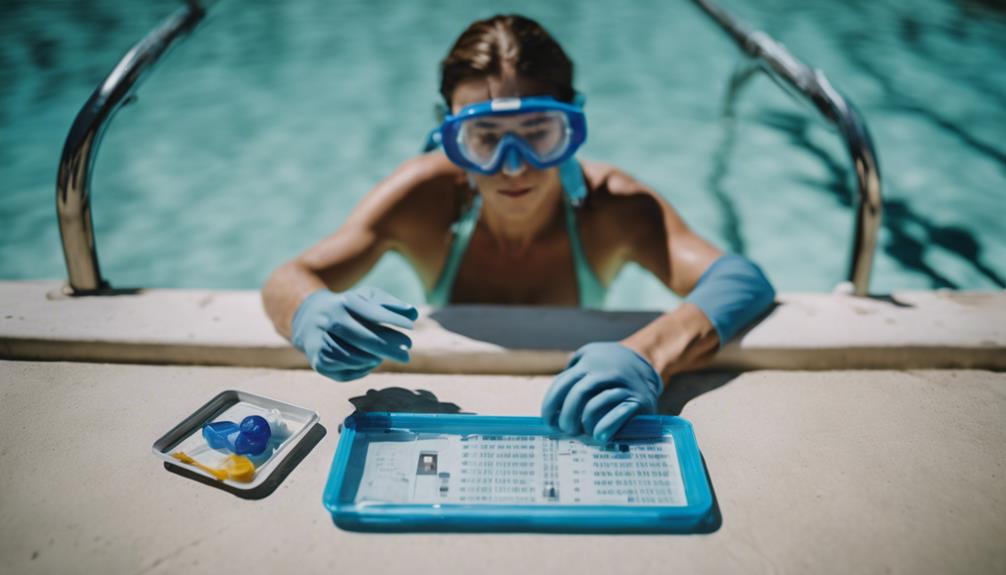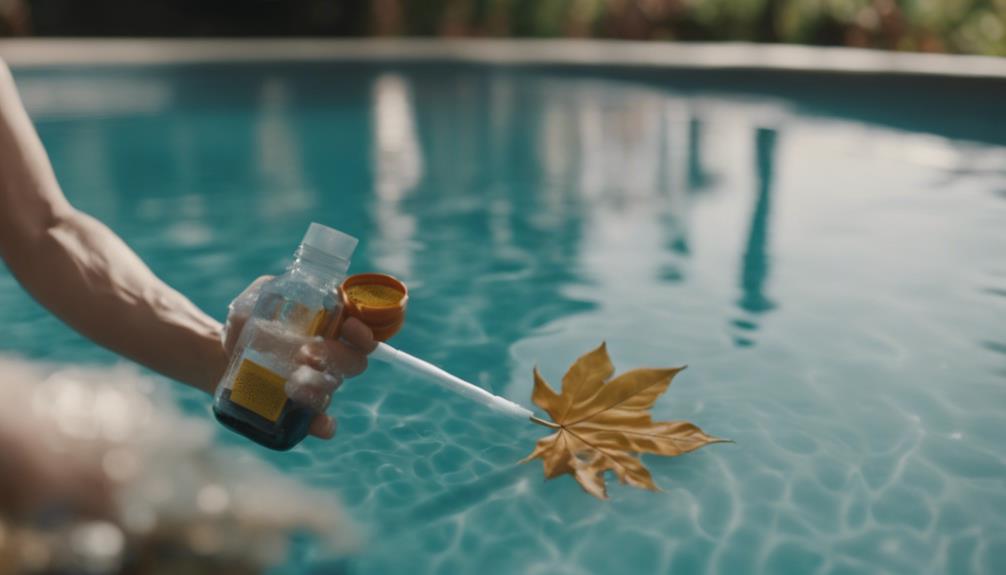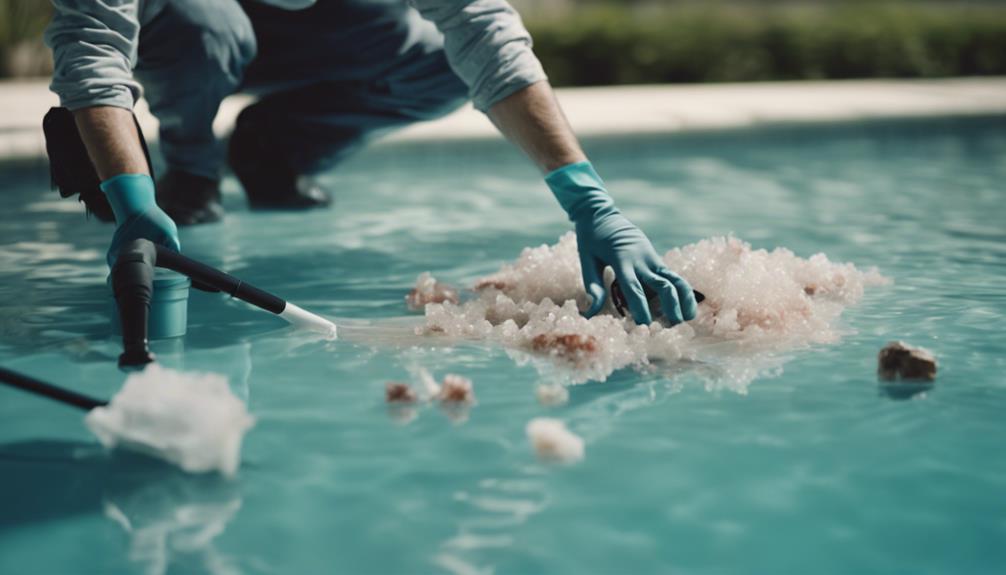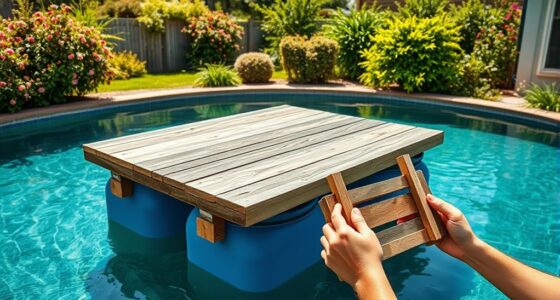Maintaining a saltwater pool involves ensuring proper sanitation, water balance, circulation, and chemical management. Key steps include testing chlorine, pH, stabilizer, and salinity levels. Regular water circulation and pump maintenance are essential to prevent contamination. Managing chlorine levels within the recommended range of 1-3 ppm is vital for safety. Monitoring and adjusting cyanuric acid levels between 40-60 ppm is crucial to maintain chlorine effectiveness. Additional care tips include cleaning the salt cell, occasional shocking, and monitoring calcium hardness levels. These steps are necessary for a well-maintained saltwater pool.
Key Takeaways
- Test chlorine, pH, stabilizer, and salinity levels regularly.
- Maintain proper water circulation for cleanliness and efficiency.
- Keep free chlorine levels between 1-3 ppm for safety.
- Monitor cyanuric acid levels (40-60 ppm) to enhance chlorine effectiveness.
- Clean salt cell, shock pool, and adjust calcium hardness for optimal care.
Sanitation and Water Balance Essentials
Maintaining proper cleanliness and water balance is essential for ensuring the purity and safety of a saltwater pool. Effective cleanliness methods, such as oxidizers and salt-chlorine generators, play a significant role in eliminating contaminants and bacteria from the pool water.
Regular testing and maintenance of chlorine, pH, stabilizer, and salinity levels are necessary to uphold water quality. Balancing cyanuric acid levels within the recommended range is important for best chlorine effectiveness.
Additionally, considering the use of the salt system boost mode during periods of heavy pool usage can help maintain water quality. By prioritizing cleanliness and water balance, saltwater pool owners can enjoy a clean and safe swimming environment.
Water Circulation Best Practices
To enhance the cleanliness and efficiency of a saltwater pool, maintaining proper water circulation is paramount. Preventing contamination and preserving water clarity are key objectives in water circulation best practices.
Running the pool pump daily is essential to make sure that water is properly filtered and circulated. Regular monitoring of water clarity and sediment accumulation can help pinpoint any issues with circulation. It is important to clean the filter based on pressure changes to uphold peak performance.
Signs of improper circulation, such as algae growth, should be promptly addressed to prevent further issues. By following these practices, saltwater pool owners can enjoy a well-maintained pool with clear and pure water.
Chlorine Levels Management Techniques

Effective management of chlorine levels in a saltwater pool is vital for ensuring water quality and safety. Maintaining free chlorine levels between 1-3 ppm is pivotal to prevent the growth of harmful bacteria and algae.
Low chlorine levels can result in inadequate sanitation, leading to waterborne illnesses, while high levels can cause skin and eye irritation. Regularly monitoring chlorine levels using test strips or kits allows for timely adjustments to maintain the proper balance.
Additionally, considering the use of boost mode during heavy pool usage or extreme weather conditions can provide an extra layer of sanitation. By diligently managing chlorine levels, saltwater pool owners can enjoy a clean and safe swimming environment for themselves and their guests.
Cyanuric Acid Maintenance Guidelines
Proper management of cyanuric acid levels is crucial for maintaining the stability and effectiveness of chlorine in a saltwater pool. To ensure peak cyanuric acid levels, consider the following guidelines:
- Regular Testing:
Test cyanuric acid levels at least once a month using a reliable testing kit.
- Maintain Levels:
Keep cyanuric acid levels between 40-60 parts per million (ppm) to prevent chlorine degradation.
- Adjust as Needed:
If levels are too low, add cyanuric acid stabilizer; if levels are high, partially drain and refill the pool to dilute the concentration.
Additional Tips for Saltwater Pool Care

Maintaining a saltwater pool goes beyond just managing cyanuric acid levels; additional tips can enhance the overall care and longevity of your pool.
Regularly inspecting and cleaning the pool's salt cell can help maintain the best chlorine production.
It's advisable to shock the pool occasionally to eliminate contaminants and prevent algae growth.
Monitoring and adjusting the pool water's calcium hardness levels can prevent scaling on pool surfaces and equipment.
Using a pool cover when the pool is not in use can help conserve water and reduce evaporation.
Additionally, ensuring proper landscaping around the pool area can minimize debris entering the water, reducing the workload on the pool's filtration system.
Frequently Asked Questions
How Often Should I Clean the Salt Cell in a Saltwater Pool?
Regular cleaning of the salt cell in a saltwater pool is essential to guarantee peak performance. It is recommended to clean the salt cell approximately every 3 months to prevent buildup and maintain efficient chlorine generation.
Can I Use Regular Pool Chemicals in a Saltwater Pool?
Yes, regular pool chemicals can typically be used in a saltwater pool, but specific products may be needed for best performance. Always consult with a professional or refer to the manufacturer's guidelines for compatibility and effectiveness.
What Is the Lifespan of a Salt-Chlorine Generator?
The lifespan of a salt-chlorine generator typically ranges between 3 to 7 years, depending on usage, maintenance, and quality of the unit. Proper care, regular cleaning, and adherence to manufacturer guidelines can extend the generator's longevity.
Are Saltwater Pools Safe for People With Sensitive Skin?
Are saltwater pools safe for people with sensitive skin? Saltwater pools are often gentler on the skin than traditional pools due to lower chlorine levels. However, individual sensitivities may vary, so it's recommended to test and monitor skin reactions.
How Can I Prevent Corrosion in a Saltwater Pool?
To prevent corrosion in a saltwater pool, maintain proper water balance by monitoring pH, alkalinity, and calcium hardness levels. Regularly inspect and maintain pool equipment, especially metal components. Consider using sacrificial anodes or coatings to protect metal surfaces from corrosion.
Conclusion
In the intricate dance of saltwater pool maintenance, one must steer through the waters with precision and care, much like a skilled sailor maneuvering the unpredictable seas.
By adhering to the principles of sanitation, water balance, and proper chemical management, pool owners can guarantee a smooth and enjoyable swimming experience.
Just as a captain steers their ship towards safe harbor, so too must pool owners guide their saltwater pools towards a pristine and inviting oasis.










